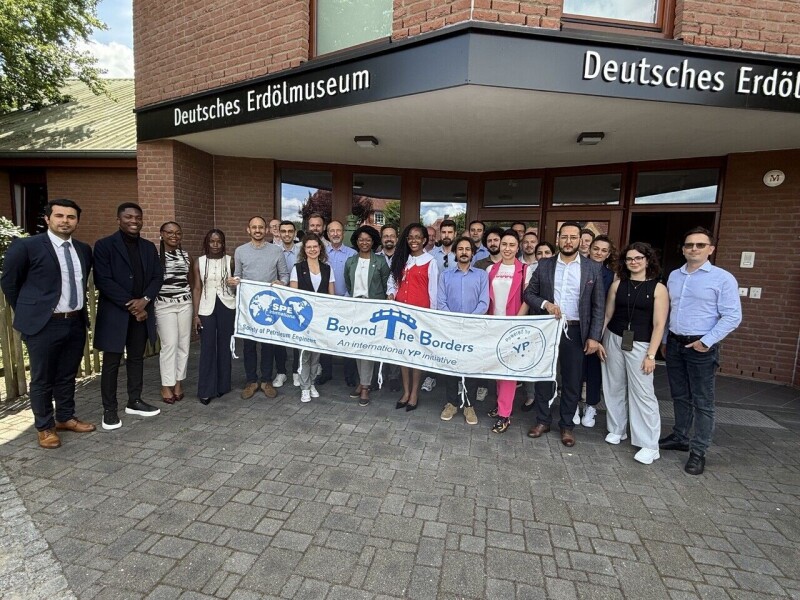Beyond the Borders (BtB) is a unique event series and initiative led by SPE’s young professionals (YPs) from various European and international SPE sections. Launched in 2018 as a partnership between SPE France, Italy, and Romania, the initiative has expanded successfully, incorporating additional countries and increased its industry awareness and popularity. Between 25–28 June 2025, the BtB event took place in Germany for the first time. The 4-day event incorporated technical session, excursions, and networking in the wider Hanover area.
Day 1—Hanover: Icebreaker Event and BVEG
On Day 1 of SPE Beyond the Borders 2025, an icebreaker event was held in Hanover at the German Federal Association for Natural Gas, Petroleum, and Geo-Energy (BVEG), for the 28 participants from 11 SPE sections. This event allowed participants to get to know each other and to receive a brief introduction about activities for the next days. Each European SPE section introduced themselves and gave a short overview of their section’s activities.
To round the day off, the host of the icebreaker event, Ingo Forstner, BVEG’s head of subsurface storage and geothermal energy, gave a presentation about their activities for the member companies from the petroleum, subsurface storage, and geo-energy sector within Germany. This set the scene nicely for the upcoming days of the BtB event.
Day 2—Wietze: Oil and Gas History and a Look Into the Future
On Day 2, the participants traveled to the German Oil Museum in Wietze. The village of Wietze has played a special role in the history of crude oil extraction. As early as the 17th century, crude oil from mineral deposits at Wietze were scooped from tar pits on the surface. In 1858, one of the first boreholes in the world for the extraction of oil was sunk here. In the early 20th century, Wietze was the oil field with the highest production rates in Germany. A wide range of oil production and processing equipment has been preserved at the abandoned oil field making the museum a unique place to experience oil and gas history.
The second day started with an opening speech by Edna Michelle Bisso Bi Mba, chairperson of SPE’s German Section. The importance of technical and social exchange at events like BtB for YPs was highlighted in addition to showing what SPE Germany can do in supporting students and YPs.

Olivier Houzé, 2025 SPE President, joined BtB in person and gave a keynote speech to YPs. Besides giving a brief overview about SPE as an organization with recent trends and developments, the key aspects discussed included the meaning of energy transition in various regions in the world, the demand of energy for humanity, and digitization in our industry.
Martin G. Lüling, independent scientific consultant, held two fascinating history sessions in a very detailed and humorous way. In the first session, Lüling focused on the historical references of oil and its usage in the ancient world, their remnants in our present time, and their significance for the historical development of the history of petroleum. The second oil history session focused on the development of the oil boom in the US, Europe, and the Caucasus region as well as Asia. The key personalities such as Rockefeller, Henri Deterding, Marcus Samuel, the Nobel brothers, Le Bel, etc., and their business ventures were put into the context of the overall oil history of the 19th and 20th centuries.
After the lunch break, the participants had the opportunity to explore the oil museum located in the decommissioned oil field. Old equipment for extracting oil and gas could be operated, historic mine shafts used for oil extraction could be viewed, and the importance of oil and gas for our society was also highlighted.
Niklas Romanowski, senior drilling engineer at Maxwell Oil Tools, made the leap from the past into the present and future with his presentation about nonmetallic materials in oil and gas. He explained the limitations of current materials, namely steel and cement, in well construction while highlighting the advantages that composite materials and carbon fiber can offer in the future for pushing the boundaries in well construction.
Uwe Balasus, managing director of NDEWG GmbH, was next to present on the geothermal trends in Germany before transitioning to the subject of career development based on his own experience having worked in the oil, gas, and geothermal industry for decades. YPs formed small groups and discussed the challenges and opportunities in their career development such as working abroad, gaining hands-on experience in the field, and opportunities in headquarter positions.
The day at the oil museum ended with a short speech by Leila Hashemi, TNO, to explain SPE Gaia, SPE’s global sustainability program, followed by an introduction to the SPE Energy Nuggets, short soft skill development videos hosted on SPE’s Energy Stream platform, created by SPE’s Business and Leadership Committee. Day 2 concluded with lots of fun at a traditional restaurant in Hanover.
Day 3—Celle: Technology and Innovation in Focus
On Day 3 of BtB, participants traveled to Celle, a global hub for oil and gas technology and home to Baker Hughes’ Celle Technology Center (CTC). The day featured deep dives into drilling technology and Germany’s geothermal potential.
Beta Rig Visit
Delegates toured the Beta Rig, Baker Hughes’ onshore full-scale test rig used to validate a wide range of drilling, completion, and production tools under realistic conditions simulating reservoir environments. It supports operational testing across diverse formations, delivering real-time rig-floor data and automated control systems to prequalify equipment before deployment offshore or at remote onshore sites.
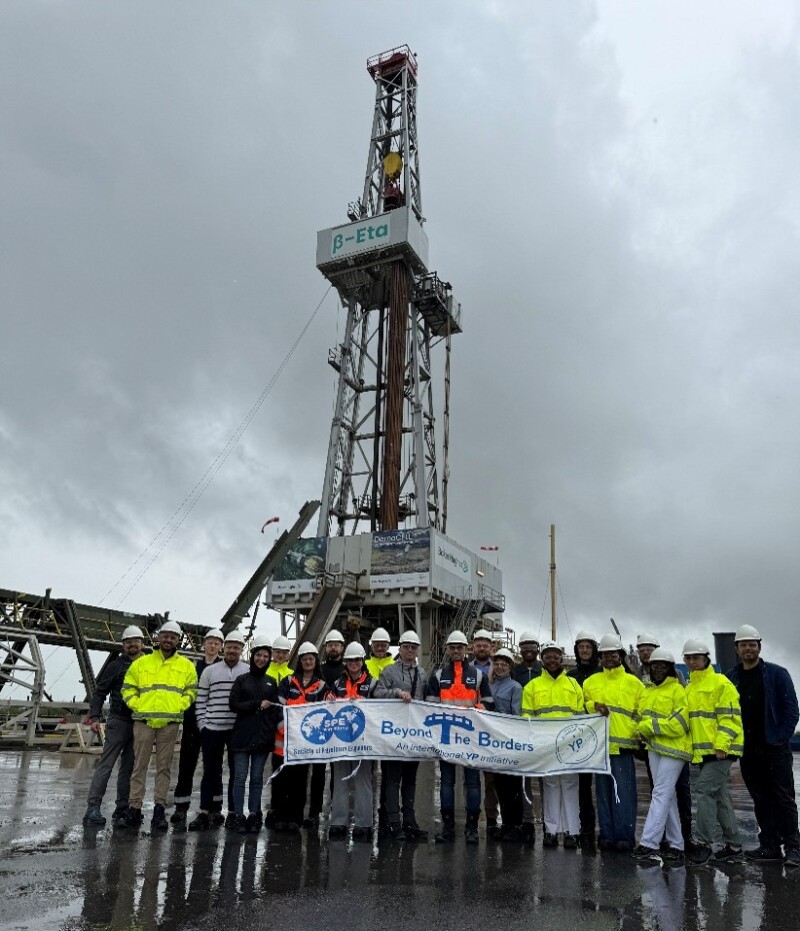
The main benefit of this testing drilling rig is ensuring reliability of complex systems—including drilling motors, directional tools, and integrated logging services—by replicating extreme pressure, torque, and temperature profiles. This is a critical step in ensuring reliability because failure of just one component offshore during drilling can lead to costly nonproductive time. It often requires pulling the entire bottomhole assembly out of the well, replacing or repairing the failed part, and running the assembly back in, all of which can cost hundreds of thousands of dollars and delay operations significantly.
By testing tools on the Beta Rig beforehand in a controlled, realistic environment, Baker Hughes helps mitigate this operational risk and ensure performance under reservoir-like conditions.
Baker Hughes CTC
Afterwards, the participants visited the Baker Hughes CTC—a leading hub for innovation in drilling and subsurface technologies. Today, CTC is home to a multidisciplinary team of engineers, PhDs, and apprentices specializing in mechanical design, electronics, embedded software, materials science, and manufacturing. Over the decades, the Celle site has driven industry-leading advancements, including the Navi-Drill motors, the first steerable and rotary closed-loop systems, PDC drill bits, MWD tools, and compact magnetic resonance logging systems.
Participants explored the manufacturing lines and labs where drilling tools are assembled, integrated with electronics, extensively tested, and prepared for field use. The demonstration showed how electronics and hardware are combined to withstand extreme downhole environments.
An engaging session on geothermal energy highlighted its evolution in Germany, the key areas of development, and its growing potential in the country.
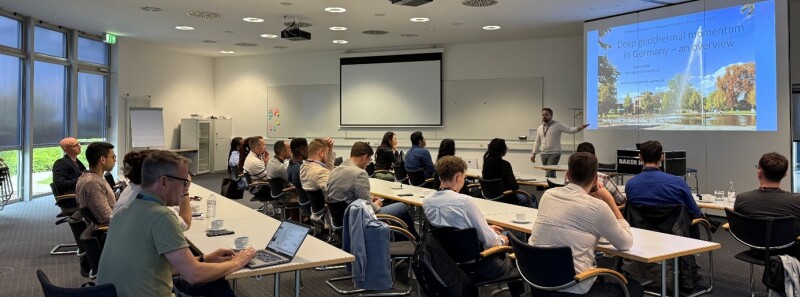
The day in Celle offered a rich learning experience for participants from across the globe. Exploring the Beta Rig and touring the CTC gave YPs firsthand insights into the complexity of drilling operations and the precision required in equipment manufacturing. Some participants work directly on wellsite operations, while others focus more on the digital and simulation aspects, making this visit a great opportunity to connect theory with real-world applications. Engaging discussions with engineers and specialists sparked curiosity and encouraged knowledge exchange on both traditional oil and gas and the growing geothermal sector. Many were impressed by the level of innovation behind the scenes and appreciated the openness of the Baker Hughes team in sharing their expertise.
It was a day that truly reflected the mission of BtB, connecting YPs across disciplines and countries through shared learning.
Day 4—Cultural Immersion in Hanover: A Reflective Finale
The final day of BtB offered a thoughtfully curated cultural experience, designed to provide participants with a moment of reflection and connection after 3 days of technical discussions and networking. The day began with a guided walking tour through Hanover’s historic center, where participants explored the city’s architectural and civic identity. The route included key landmarks such as the Hauptbahnhof, Kröpcke Square with its iconic clock, the Staatsoper, and the impressive Neues Rathaus, where many took the opportunity to ascend the dome for panoramic views of the city. The tour continued through the Gothic Marktkirche and the medieval Altes Rathaus, before arriving at the haunting ruins of Aegidienkirche, preserved as a World War II memorial. The walk concluded in the Altstadt, Hanover’s charming Old Town, where half-timbered houses and cobblestone streets created a setting ripe for informal conversations and cultural exchange.
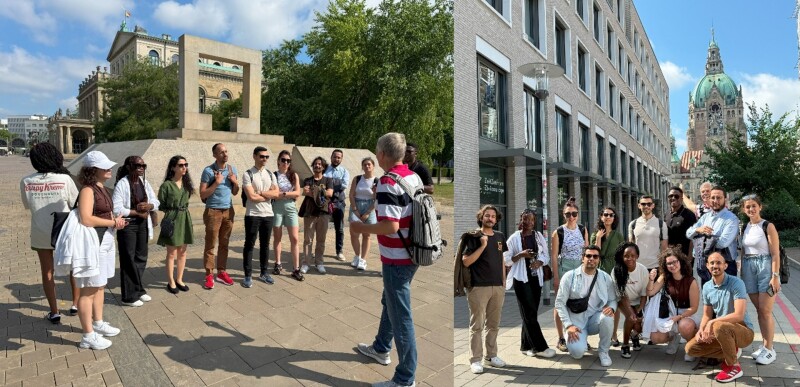
In the afternoon, the group gathered at Maschsee, a 7-km-long lake just south of the city center, for a peaceful boat tour. Surrounded by green parks and open skies, the tour offered a welcome contrast to the high-energy pace of the previous days. As the boat glided across the water, participants shared reflections on the event, exchanged stories, and enjoyed a more relaxed atmosphere that encouraged deeper personal connections. The natural setting provided a moment to recharge and appreciate Hanover’s unique blend of urban structure and natural beauty.
The day concluded with a visit to the rooftop of the Altes Rathaus, offering sweeping views over the city’s rooftops and tree-lined avenues. This final perspective served as a symbolic closing moment—standing above the city, united in purpose and vision. It was a quiet yet powerful reminder of the broader mission of BtB to foster global collaboration, embrace cultural diversity, and build a community rooted in shared values. The Hanover cultural day was not just a conclusion, but a celebration of the human connections that make our work meaningful.
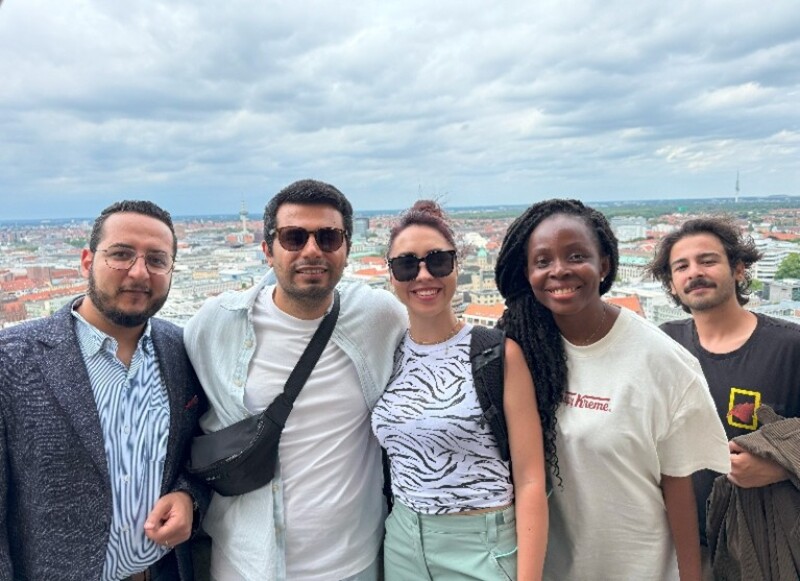
A special thank you to Baker Hughes for hosting the CTC visit and to our generous sponsors including two platinum sponsors Maxwell Oil Tools and Harbour Energy, and our gold sponsors Neptune Energy, Multiline GmbH & Co. KG, Robke Erdöl- und Erdgastechnik GmbH, and ExxonMobil whose support made this event possible!
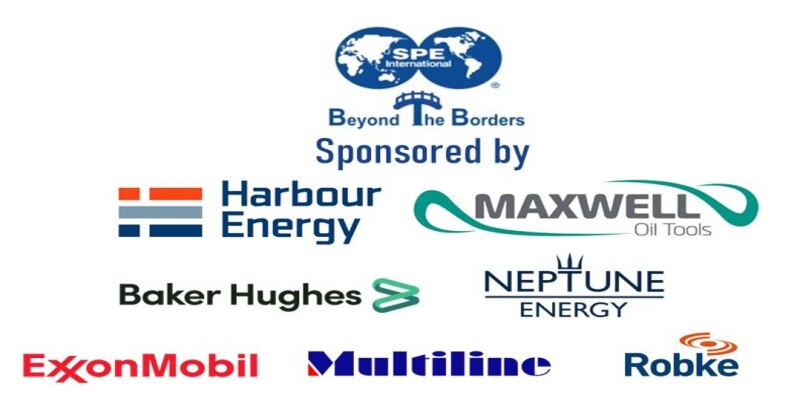
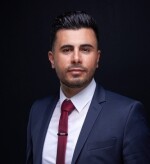
Rasoul Foroutan, SPE, is a well integrity engineer at Neptune Energy, serving as the focal point for well integrity operations in Germany. With a strong background in well engineering and operations, he brings hands-on field experience and technical leadership to the management of well integrity systems, diagnostics, and regulatory compliance. He holds a master’s degree in petroleum engineering from Technical University Clausthal with academic experience in Istanbul and Tehran.
An active member of SPE, Rasoul currently leads the SPE German Section’s Young Professionals Committee, driving initiatives to connect early-career professionals. He is passionate about collaboration and knowledge sharing in the energy community.
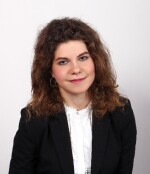
Kseniia Zhukova, SPE, is a petroleum engineer with international experience across both onshore and offshore production operations. She holds a master’s degree in petroleum engineering from Leoben Montanuniversität in Austria. She works at Harbour Energy, where she combines her operational background with a strong interest in digitalization, contributing to projects that support safety and performance improvements.
An SPE member, she is part of the SPE German Section’s Young Professionals Committee and actively engaged in various global SPE initiatives, including mentoring programs and technical conference committees. She values cross-cultural collaboration and interdisciplinary thinking in the industry.

Niklas Romanowski, SPE, is a senior drilling engineer at Maxwell Oil Tools. He holds a master’s degree in petroleum engineering from Clausthal University, with studies abroad at NTNU (Norway) and the University of Oklahoma. He has worked as a wellsite engineer in the North Sea and contributed to some of the first CCS pilot projects in Europe. He supports challenging wells worldwide with state-of-the-art composite centralizers and drill pipe protectors.
In addition to his involvement with SPE, he has led an IOGP work group for CCS well abandonment and currently leads a ISO work group for updating well engineering standards.

